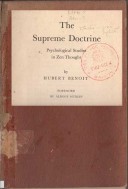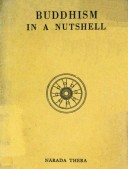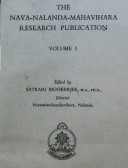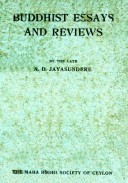Tìm Sách
Sách tiếng Anh-English >> The Supreme Doctrine
Thông tin tra cứu
- Tên sách : The Supreme Doctrine
- Tác giả : Hubert Benoit
- Dịch giả :
- Ngôn ngữ : Anh
- Số trang : 247
- Nhà xuất bản : The Viking Press New York
- Năm xuất bản : 1960
- Phân loại : Sách tiếng Anh-English
- MCB : 12010000003998
- OPAC :
- Tóm tắt :
The supreme doctrine
Psychological Studies in Zen Thought
By Hubert Benoit
Foreword by Aldous Huxley
The Viking Press New York
Foreword
Philosophy in the Orient is never pure speculation, but always some form of transcendental pragmatism. Its truths, like those of modern physics, are to be tested operationally. Consider, for example, the basic doctrine of Vedanta, of Mahayana Buddhism, of Taoism, of Zen. ‘Tat twan asi – thou art That’. ‘Tao is the root to which we may return, and so become again That which, in fact, we have always been’. ‘Samsara and Nirvana, Mind and individual minds, sentient beings and the Buddha, are one’. Nothing could be more enormously metaphysical than such affirmations; but, at the same time, nothing could be less theoretical, idealistic, Pickwickian. They are known to be true because, in a super-Jamesian way, they work, because there is something that can be done with them. The doing of this something modifies the doer’s relations with reality as a whole. But knowledge is in the knower according to the mode of the knower. When transcendental pragmatists apply the operational test to their metaphysical hypotheses, the mode of their existence changes, and they know everything, including the proposition, ‘thou art That’, in an entirely new and illuminating way.
The author of this book is a psychiatrist, and his thoughts about the Philosophia Perennis in general and about Zen in particular are those of a man professionally concerned with the treatment of troubled minds. The difference between Eastern philosophy, in its therapeutic aspects, and most of the systems of psychotherapy current in the modern west may be summarized in a few sentences.
The aim of western psychiatry is to help the troubled individual to adjust himself to the society of less troubled individuals – individuals who are observed to be well adjusted to one another and the local institutions, but about whose adjustment to the fundamental Order of Things no enquiry is made. Counseling, analysis, and other methods of therapy are used to bring these troubled and maladjusted persons back to a normality, which is defined.
Contents
Foreword by Aldous Huxley
Author’s preface
I. On the general sense of Zen thought
II. ‘Good’ and ‘evil’
III. The idolatry of ‘salvation’
IV. The existentialism of Zen
V. The mechanism of anxiety
VI. The five modes of thought of the natural man-psychological conditions of Satori
VII. Liberty as ‘total determinism’
VIII. The egotistical states
IX. The Zen unconscious
X. Metaphysical distress
XI. Seeing into one’s own nature-the spectator of the spectacle
XII. How to conceive the inner task according to Zen
XIII. Obedience to the nature of things
XIV. Emotion and the emotive state
XV. Sensation and sentiment
XVI. On affectivity
XVII. The horseman and the horse
XVIII. The primordial error or ‘original sin’
XIX. The immediate presence of Satori
XX. Passivity of the mind and disintegration of our energy
XXI. On the idea of ‘discipline’
XXII. The compensations
XXIII. The inner alchemy
XXIV. On humility
Epilogue
Index
 Facebook
Facebook
 Google
Google
 Google+
Google+


















